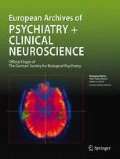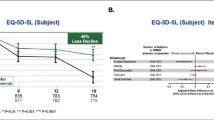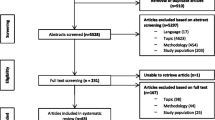Abstract
Outcome in schizophrenia is multidimensional and, thus, consists of clinical,humanitarian, rehabilitative and cost domains. Accordingly, recovery is conceptualized as the ability to function in the community, socially and vocationally, as well as being relatively free of disease–related psychopathology. The present cross–sectional study examined the relationship of premorbid functioning, psychopathology, insight, attitudes toward medication and side–effects, as well as sociodemographic factors with treatment outcomes in terms of quality of life (QOL) and psychosocial functioning among 60 regular attendees of a specialized schizophrenia outpatient clinic. Both insight into the illness as well as attitudes toward treatment indicated satisfactory compliance. Premorbid school and social functioning were positively correlated with actual employment status, and premorbid social functioning was further positively correlated with QOL and global functioning. Attitudes toward treatment were positively associated with global QOL, and with the patients' living situation. Both positive and negative symptoms as well as asthenia were negatively associated with QOL, while cognitive symptoms negatively influenced occupational functioning. Older patients lived independently and/or in a partnership more often, but had a lesser likelihood of competitive employment. Our observations suggest that subjective and functional outcomes in highly compliant patients are mainly predicted by psychopathological symptoms and unchangeable sociodemographic variables.
Similar content being viewed by others
References
Addington J, Addington D (1993) Premorbid functioning, cognitive functioning, symptoms, and outcome in schizophrenia. J Psychiatry Neurosci 18:18–23
Allison DB, Mackell JA, McDonnell DD (2003) The impact of weight gain on quality of life among persons with schizophrenia. Psychiatr Serv 54:565–567
American Psychiatric Association (1994) Diagnostic and Statistical Manual of Mental Disorders, 4th ed. APA, Washington D. C.
Andreasen NC, Carpenter WT, Kane JM, Lasser RA, Marder SR, Weinberger DR (2005) Remission in schizophrenia: proposed criteria and rationale for consensus. Am J Psychiatry 162:441–449
Andreasen NC, Flaum M, Arndt S (1992) The Comprehensive Assessment of Symptoms and History (CASH). An instrument for assessing diagnosis and psychopathology. Arch Gen Psychiatry 49:615–623
Awad AG, Hogan TP (1994) Subjective response to neuroleptics and quality of life: implications for treatment outcome. Acta Psychiatr Scand 89(Suppl 380):27–31
Awad AG, Hogan TP, Voruganti LN, Heslegrave RJ (1995) Patients' subjective experiences on antipsychotic medications: implications for outcome and quality of life. Int Clin Psychopharmacol 10(Suppl 3):123–132
Bailer J, Brauer W, Rey ER (1996) Premorbid adjustment as predictor of outcome in schizophrenia: results of a prospective study. Acta Psychiatr Scand 93:368–377
Beiser M, Bean G, Erickson D, Zhan J, Iacono WG, Rector NA (1994) Biological and psychosocial predictors of job performance following a first episode of psychosis. Am J Psychiatry 151:857–863
Breier A, Schreiber JL, Dyer J, Pickar D (1991) National Institute of Mental Health longitudinal study of chronic schizophrenia: prognosis and predictors of outcome. Arch Gen Psychiatry 48:239–246
Brekke JS, Levin S, Wolkon G, Sobel G, Slade B (1993) Psychosocial functioning and subjective experience in schizophrenia. Schizophr Bull 19:599–608
Browne S, Garavan J, Gervin M, Roe M, Larkin C, O'Callaghan C (1998) Quality of life in schizophrenia: insight and subjective response to neuroleptics. J Nerv Ment Dis 186:74–78
Browne S, Clarke M, Gervin M, Waddington JL, Larkin C, O'Callaghan E (2000) Determinants of quality of life at first presentation with schizophrenia. Br J Psychiatry 176:173–176
Cabeza IG, Amador MS, Lopez CA, Conzalez de Chavez M (2000) Subjective response to antipsychotics in schizophrenic patients: clinical implications and related factors. Schizophr Res 41:349–355
Cannon–Spoor HE, Potkin SG, Wyatt RJ (1982) Measurement of premorbid adjustment in chronic schizophrenia. Schizophr Bull 8:470–484
DeJong A, Giel R, Slooff CJ, Wiersma D (1986) Relationship between symptomatology and social disability. Empirical evidence from a follow–up study of schizophrenic patients. Soc Psychiatry 21:200–205
Dickerson F, Boronow JJ, Ringel N, Parente F (1999) Social functioning and neurocognitive deficits in outpatients with schizophrenia: a 2–year follow–up. Schizophr Res 37:13–20
Doyle M, Flanagan S, Browne S, Clarke M, Lydon D, Larkin C, O'Callaghan E (1999) Subjective and external assessments of quality of life in schizophrenia: relationship to insight. Acta Psychiatr Scand 99:466–472
Fleischhacker WW (2002) Pharmacological treatment of schizophrenia: a review. In: Maj M, Sartorius N (eds) Schizophrenia. WPA Series Evidence and Experience in Psychiatry. John Wiley and Sons LTD, Chichester NY Weinheim Brisbane Singapore Toronto, pp 75–113
Fleischhacker WW, Rabinowitz J, Kemmler G, Lasser RA, Mehnert A (2005) Perceiving functioning, well–being and association with psychiatric symptomatology in clinically stable schizophrenia patients treated with long–acting risperidone for 1 year. Br J Psychiatry (in press)
Freudenreich O, Cather C, Evins AE, Henderson DC, Goff DC (2004) Attitudes of schizophrenia outpatients toward psychiatric medications: relationship to clinical variables and insight. J Clin Psychiatry 65:1372–1376
Gaite L, Vázquez–Barquero JL, Borra C, Ballesteros J, Schene A, Welcher B, Thornicroft G, Becker T, Ruggeri M, Herran A (2002) Quality of life in patients with schizophrenia in five European countries: the EPSILON study. Acta Psychiatr Scand 105:283–292
Gervin M, Browne S, Garavan J, Roe M, Larkin C, O'Callaghan E (1999) Dysphoric subjective response to neuroleptics in schizophrenia: relationship to extrapyramidal side effects and symptomatology. Eur Psychiatry 14:405–409
Goldberg RW, Green–Paden LD, Lehman AF, Gold JM (2001) Correlates of insight in serious mental illness. J Nerv Ment Dis 189:137–145
Hofer A, Kemmler G, Eder U, Honeder M, Hummer M, Fleischhacker WW (2002) Attitudes toward antipsychotics among outpatient clinic attendees with schizophrenia. J Clin Psychiatry 63:49–53
Hofer A, Kemmler G, Eder U, Edlinger M, Hummer M, Fleischhacker WW (2004) Quality of life in schizophrenia: the impact of psychopathology, attitude toward medication, and side effects. J Clin Psychiatry 65:932–939
Hofer A, Baumgartner S, Edlinger M, Hummer M, Kemmler G, Rettenbacher MA, Schweigkofler H, Schwitzer J, Fleischhacker WW (2005) Patient outcomes in schizophrenia I: correlates with sociodemographic variables, psychopathology, and side effects. Eur Psychiatry (in press)
Hofer A, Baumgartner S, Bodner T, Edlinger M, Hummer M, Kemmler G, Rettenbacher MA, Fleischhacker WW (2005) Patient outcomes in schizophrenia II: the impact of cognition. Eur Psychiatry (in press)
Hogan TP, Awad AG, Eastwood R (1983) A self–report scale predictive of drug compliance in schizophrenics: reliability and discriminative validity. Psychol Med 13:177–183
Kay SR, Fiszbein A, Opler LA (1997) The Positive and Negative Syndrome Scale (PANSS) for schizophrenia. Schizophr Bull 13:261–276
Kemmler G, Holzner B, Neudorfer C, Meise U, Hinterhuber H (1997) General life satisfaction and domain–specific quality of life in chronic schizophrenic patients. Qual Life Res 6:265–273
Lambert M, Naber D (2004) Current issues in schizophrenia: overview of patient acceptability, functioning capacity and quality of life. CNS Drugs 18(Suppl 2):5–17
Leary J, Johnstone EC, Owens DGC (1991) Social outcome. Br J Psychiatry 159(Suppl 13):13–21
Lindenmayer JP, Bernstein–Hyman R, Grochowski S (1994) Fivefactor model of schizophrenia. J Nerv Ment Dis 182:631–638
Lindenmayer JP, Grochowski S, Hyman RB (1995) Five factor model of schizophrenia: replication across samples. Schizophr Res 14:229–234
Lindstrom LH (1996) Clinical and biological markers for outcome in schizophrenia: a review of a longitudinal follow–up study in Uppsala schizophrenia research project. Neuropsychopharmacology 14(Suppl 3):23S–26S
Lingjaerde O, Ahlfors UG, Bech P, Dencker SJ, Elgen K (1987) The UKU Side Effect Rating Scale – a new comprehensive rating scale for psychotropic drugs and a cross–sectional study of side effects in neuroleptic–treated patients. Acta Psychiatr Scand 334(Suppl):1–100
Lysaker P, Bell M, Milstein R, Bryson G, Beam–Goulet J (1994) Insight and psychosocial treatment compliance in schizophrenia. Psychiatry 57:307–315
McEvoy JP, Apperson LJ, Apfelbaum PS, Ortlip P, Brecosky J, Hammill K, Geller JL, Roth L (1989) Insight in schizophrenia. Its relationship to acute psychopathology. J Nerv Ment Dis 177:43–47
McGlashan TH (1988) A selective review of recent North American long–term follow–up studies of schizophrenia. Schizophr Bull 14:515–542
McGurk S, Moriarty PJ, Harvey PD, Parrella M, White L, Davis KL (2000) The longitudinal relationship of clinical symptoms, cognitive functioning, and adaptive life in geriatric schizophrenia. Schizophr Res 42:47–55
McGurk SR, Mueser KT (2003) Cognitive functioning and employment in severe mental illness. J Nerv Ment Dis 191:789–798
Mueser KT (2000) Cognitive functioning, social adjustment, and long–term outcome in schizophrenia. In: Sharma T, Harvey P (eds) Cognition in Schizophrenia. Oxford University Press, New York NY, pp 157–177
Mueser KT (2002) Cognitive impairment, symptoms, social functioning, and vocational rehabilitation in schizophrenia. In: Kashima H, Falloon IRH, Mizuno M, Asai M (eds) Comprehensive treatment of schizophrenia: linking neurobehavioral findings to psychosocial approaches. Sprinter–Verlag, Tokyo, pp 344–351
Nasrallah HA, Targum SD, Tandon R, McCombs JS, Ross R (2005) Defining and measuring clinical effectiveness in the treatment of schizophrenia. Psychiatr Serv 56:273–282
Prudo R, Monroe–Blum H (1987) Five year outcome and prognosis in schizophrenia; a report from the London field centre of the international pilot study of schizophrenia. Br J Psychiatry 150:345–354
Racenstein JM, Harrow M, Reed R, Martin E, Herbener E, Penn DL (2002) The relationship between positive symptoms and instrumental work functioning in schizophrenia: a 10 year followup study. Schizophr Res 56:95–103
Ritsner M, Modai I, Endicott J, Ravkin O, Nechamkin Y, Barak P, Goldin V, Ponizovsky A (2000) Differences in quality of life domains and psychopathologic and psychosocial factors in psychiatric patients. J Clin Psychiatry 61:880–889
Ritsner M, Kurs R, Gibel A, Hirschmann S, Shinkarenko E, Ratner Y (2003) Predictors of quality of life in major psychoses: a naturalistic follow–up study. J Clin Psychiatry 64:308–315
Robinson DG, Woerner MG, Alvir JM, Bilder RM, Hinrichsen GA, Lieberman JA (2002) Predictors of medication discontinuation by patients with first–episode schizophrenia and schizoaffective disorder. Schizophr Res 57:209–219
Sim K, Mahendran R, Siris SG, Heckers S, Chong SA (2004) Subjective quality of life in first episode schizophrenia spectrum disorders with comorbid depression. Psychiatry Res 129:141–147
Strauss JS, Carpenter WT (1972) The prediction of outcome in schizophrenia I: characteristics of outcome. Arch Gen Psychiatry 17:739–746
The WHOQOL Group (1998) Development of the World Health Organization WHOQOL–BREF quality of life assessment. Psychol Med 28:551–558
Thornicroft G, Tansella M, Becker T, Knapp M, Leese M, Schene A (2004) The personal impact of schizophrenia in Europe. Schizophr Res 69:125–132
Ucok A, Polat A, Cakir S, Genc A (2005) One year outcome in first episode schizophrenia. Predictors of relapse. Eur Arch Psychiatry Clin Neurosci
Voruganti L, Cortese L, Owyeumi L, Kotteda V, Cernovsky Z, Zirul S, Awad A (2002) Switching from conventional to novel antipsychotic drugs: results of a prospective naturalistic study. Schizophr Res 57:201–208
Weiden PJ, Shaw E, Mann JJ (1986) Causes of neuroleptic noncompliance. Psychiatr Ann 16:571–575
Weiden P, Aquila R, Standard J (1996) Atypical antipsychotic drugs and long–term outcome in schizophrenia. J Clin Psychiatry 57(Suppl 11):53–60
Williams CC, Collins A (2002) Factors associated with insight among outpatients with serious mental illness. Psychiatr Serv 53:96–98
Author information
Authors and Affiliations
Corresponding author
Rights and permissions
About this article
Cite this article
Hofer, A., Rettenbacher, M.A., Widschwendter, C.G. et al. Correlates of subjective and functional outcomes in outpatient clinic attendees with schizophrenia and schizoaffective disorder. Eur Arch Psychiatry Clin Neurosci 256, 246–255 (2006). https://doi.org/10.1007/s00406-005-0633-3
Received:
Accepted:
Published:
Issue Date:
DOI: https://doi.org/10.1007/s00406-005-0633-3




